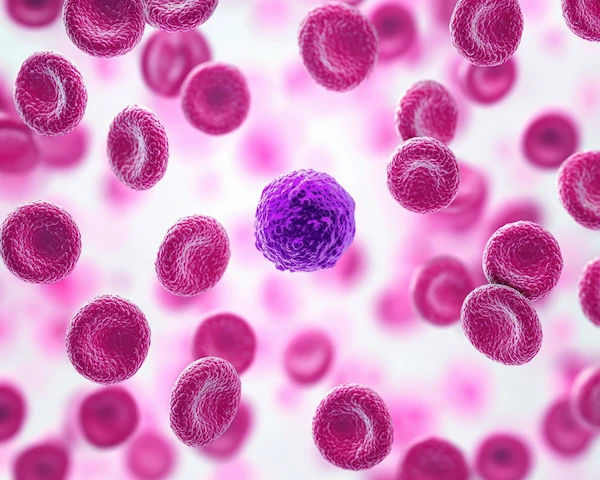What Is A CBC Blood Test And Why Is It Done?
Understand what a CBC blood test is, why it’s done, and what it reveals about your overall health, including infections, anaemia, and other blood-related conditions.

Written by Dr. Rohinipriyanka Pondugula
Reviewed by Dr. Siri Nallapu MBBS
Last updated on 9th Sep, 2025

A blood test is often the first step in understanding what’s going on inside your body when you feel unwell. Among the many tests available today, the CBC blood test, short for Complete Blood Count, is one of the most commonly recommended. But what is CBC test exactly, and why is it considered so important in modern healthcare?
In this comprehensive guide, we’ll provide the complete blood count explained in simple terms, highlight what each component of the test means, and tell you when and why you might need one. Whether you’re going in for a routine health check or trying to diagnose a specific illness, understanding the CBC test can empower you to take better control of your health.
What Is a CBC Test?
The CBC test (Complete Blood Count) is a routine blood test that measures various components and features of your blood. These include red blood cells, white blood cells, platelets, haemoglobin levels, and haematocrit. Each of these parameters plays a specific role in maintaining your body’s health and immune defence. By examining them, doctors can gain vital clues about infections, anaemia, immune system disorders, and even some types of cancer. In essence, a CBC test acts like a dashboard of your body’s blood health.
Why Is the CBC Test Done?
Doctors recommend the CBC test in a variety of clinical situations. Some of the most common reasons include:
- To evaluate general health: Part of a routine health check-up.
- To diagnose a medical condition: If you're experiencing fatigue, weakness, fever, or unexplained bruising.
- To monitor an existing condition: Such as anaemia, infection, or ongoing cancer treatment.
- To check how treatments are working: For example, chemotherapy or medications that affect blood cells.
What Conditions Can a CBC Test Help Detect?
A CBC test helps identify a wide range of medical conditions, including:
- Anaemia: Detects low red blood cell count or haemoglobin, indicating reduced oxygen-carrying capacity.
Infections (bacterial, viral, or parasitic): Elevated or decreased white blood cell counts help indicate the presence and type of infection. - Leukaemia and other blood cancers: Abnormal white blood cell counts and immature cells may suggest malignancies like leukaemia.
- Vitamin and mineral deficiencies (like iron or B12): Unusual red cell size or haemoglobin content can signal nutritional deficiencies.
- Bone marrow disorders: Abnormal counts in all three cell types (RBCs, WBCs, platelets) can point to bone marrow malfunction.
- Autoimmune diseases: Changes in white blood cell counts may reflect immune system overactivity or suppression.
- Bleeding or clotting disorders: Low platelet count can indicate a risk of excessive bleeding or poor clot formation.
Complete Blood Count Explained: A Simple Breakdown of Key Parameters
Let’s take a closer look at the individual components measured in a CBC blood test, and what each of them reveals about your health.
1. Red Blood Cells (RBCs)
Red blood cells carry oxygen from your lungs to the rest of your body and return carbon dioxide to be exhaled.
- Normal Range (Male): 4.7 to 6.1 million cells/mcL
- Normal Range (Female): 4.2 to 5.4 million cells/mcL
Why it matters: Low RBC count may suggest anaemia, blood loss, or nutritional deficiency. High RBC count could indicate dehydration or heart disease.
2. Haemoglobin (Hb)
Haemoglobin is the protein in red blood cells that binds to oxygen.
- Normal Range (Male): 13.8 to 17.2 g/dL
- Normal Range (Female): 12.1 to 15.1 g/dL
Why it matters: Low haemoglobin = anaemia which leads to fatigue, breathlessness. High levels may point to lung disease or living at high altitude.
3. Haematocrit (Hct)
Haematocrit measures the percentage of your blood volume that’s made up of red blood cells.
- Normal Range (Male): 40.7% to 50.3%
- Normal Range (Female): 36.1% to 44.3%
Why it matters: Low haematocrit may reflect anaemia or blood loss. High values can indicate dehydration or polycythaemia.
4. White Blood Cells (WBCs)
These cells defend the body against infection.
- Normal Range: 4,500 to 11,000 cells/mcL
Why it matters: A high WBC count might indicate an infection, inflammation, stress, or leukaemia. A low count could be due to viral infections, bone marrow disorders, or certain medications.
5. WBC Differential Count
This breaks down the five main types of white blood cells:
- Neutrophils: increase with bacterial infections
- Lymphocytes: elevated in viral infections
- Monocytes: seen in chronic infections
- Eosinophils: rise during allergies or parasitic infections
- Basophils: involved in allergic reactions
Why it matters: A differential count helps pinpoint the exact cause of abnormal WBC levels.
6. Platelets (Thrombocytes)
Platelets are responsible for clotting and preventing excessive bleeding.
- Normal Range: 150,000 to 450,000 platelets/mcL
Why it matters: Low platelets (thrombocytopenia) may lead to bleeding and bruising. High levels (thrombocytosis) might indicate inflammation, iron deficiency, or bone marrow issues.
Get A CBC Test Done
7. Mean Corpuscular Volume (MCV)
MCV measures the average size of red blood cells.
- Normal Range: 80 to 96 femtolitres
Why it matters:
- Low MCV = microcytic anaemia (e.g., iron deficiency)
- High MCV = macrocytic anaemia (e.g., B12 or folate deficiency)
8. Mean Corpuscular Haemoglobin (MCH)
Indicates the average amount of haemoglobin per red blood cell.
- Normal Range: 27 to 33 picograms
Why it matters: Helps determine if anaemia is due to iron deficiency or another cause.
9. Red Cell Distribution Width (RDW)
Shows variation in the size of your red blood cells.
- Normal Range: 11.5% to 14.5%
Why it matters: High RDW may indicate a mix of old and new RBCs, suggesting nutritional deficiencies or bone marrow issues.
Who Should Take a CBC Test?
The CBC blood test is suitable for almost every adult. You may need it if:
- You feel persistently tired or weak
- You have frequent infections or fevers
- You experience unexplained bleeding or bruising
- You have a chronic condition like diabetes or kidney disease
- You're undergoing treatment that affects blood cells (like chemotherapy)
- You’re having surgery or are being monitored after one
Do You Need to Fast Before a CBC Test?
No, fasting is not required for a CBC test. You can take it at any time of the day unless your doctor has included it as part of a larger panel that requires fasting, like lipid or glucose testing.
However, staying well hydrated before your test can make the blood draw easier.
How Is the CBC Test Done?
It’s a simple and quick procedure:
- A phlebotomist or nurse draws a small blood sample from a vein, usually in your arm.
- The sample is sent to a lab where it’s analysed using automated equipment.
- Results are typically available within 24 hours or less.
Interpreting CBC Results
While a CBC report provides numerical values, interpretation should always be done by a qualified doctor. That said, here’s a quick reference table:
What Should You Do After Receiving Your Results?
Once you receive your CBC test results, it's important to understand what they mean and take the right steps to address any abnormalities. Here’s what you should do after receiving the results:
- Don’t panic if you see a result outside the reference range. Many minor variations are harmless or temporary.
- Consult your general practitioner to interpret your results in the context of your symptoms and history.
- Follow-up tests may be recommended to confirm a diagnosis or monitor progress.
- Avoid self-medicating, especially for anaemia or infections, without professional advice.
Benefits of Booking a CBC Test with Apollo 24|7
Here are the benefits of booking a CBC test with Apollo 24|7:
- Certified NABL-accredited labs
- Expert pathologist review
- Free home sample collection
- Easy digital access to reports
- Doctor consultation available with test reports
You can also explore combo packages that include CBC with other tests like:
Conclusion
The Complete Blood Count (CBC) test is one of the most versatile and essential diagnostic tools in modern medicine. Whether you’re feeling unwell, monitoring a health condition, or simply staying on top of your health, a CBC test can provide deep insights into your body’s functioning.
By understanding the CBC report in plain terms, you can have more informed conversations with your doctor and take proactive steps toward better health. So the next time you hear someone ask, “What is CBC test?”, you’ll not only have the answer – you’ll know how vital it is in keeping you healthy. Don't wait to investigate the cause of symptoms like fatigue or frequent illness. Book your CBC blood test today with Apollo 24|7 and get results from trusted labs across India.



.webp)

